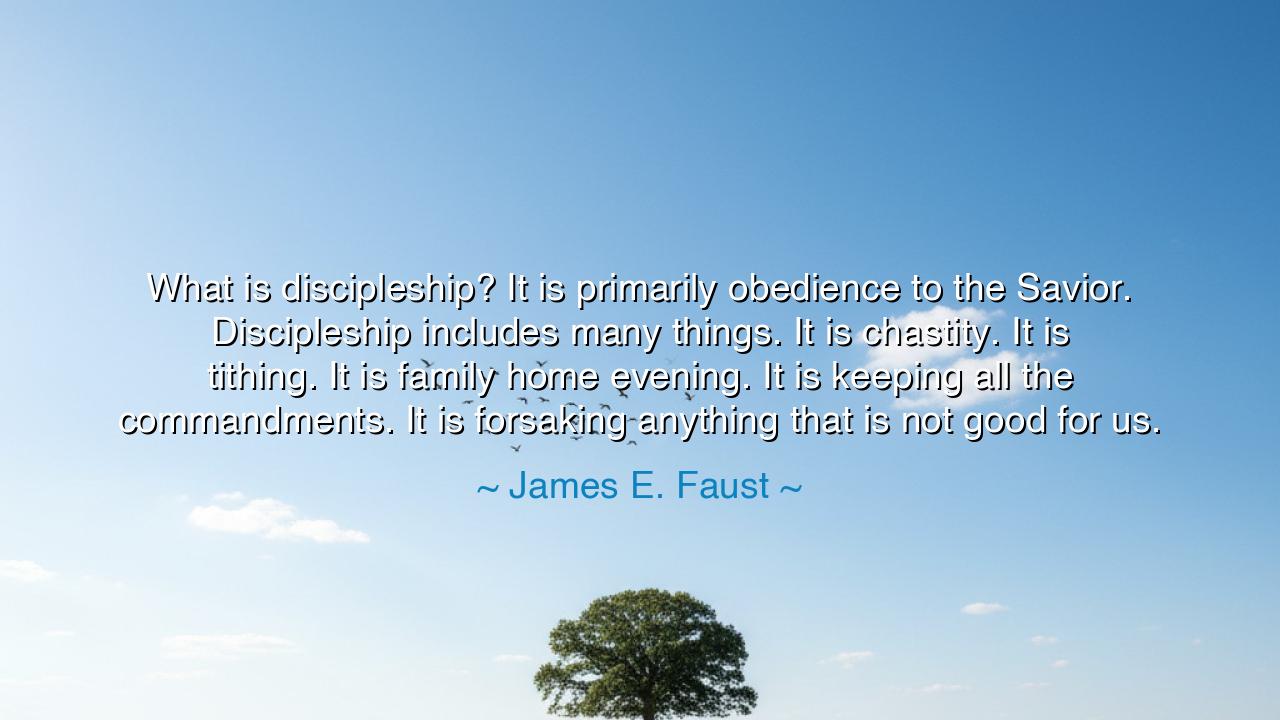
What is discipleship? It is primarily obedience to the Savior.
What is discipleship? It is primarily obedience to the Savior. Discipleship includes many things. It is chastity. It is tithing. It is family home evening. It is keeping all the commandments. It is forsaking anything that is not good for us.






In the hush of covenant and dawn, the elder voice of James E. Faust poses a simple riddle and answers it with a clarion: “What is discipleship? It is primarily obedience to the Savior. Discipleship includes many things. It is chastity. It is tithing. It is family home evening. It is keeping all the commandments. It is forsaking anything that is not good for us.” Hear how each phrase is a step laid upon a mountain path—plain stones, not polished marble—meant for feet that will actually climb. The meaning is not hidden in mystery; it is anchored in doing. To be a disciple, he says, is to align the will, to order the day, to choose the narrow but luminous road where love proves itself in loyal habits.
Mark the order of his words. First comes obedience—the bending of the heart toward the Savior—and only then the many tributaries: chastity, tithing, family home evening, the whole river of commandments. This is the ancient rhythm: devotion before detail, allegiance before arithmetic. Without that first vow, the rest frays into rules; with it, rules ripen into rituals that hold the soul the way a trellis holds a vine. Discipleship is not a scattered list but a woven life, where each thread strengthens the others until a garment of peace is made.
Consider why these named practices matter. Chastity guards the temple of desire, teaching us that love is promise and not appetite. Tithing consecrates our increase, reminding us that all coin is on loan from Heaven and that generosity breaks the spine of fear. Family home evening—a humble hearth lit weekly—sanctifies the ordinary, sewing learning and laughter into memory so that doctrine grows roots. The commandments themselves are not chains but rails, guiding the pilgrim’s weight through perilous turns. And forsaking what harms us—habits, entertainments, even friendships that corrode—clears the field where better seed can take.
A story, then, to give these stones body. In the high desert, a young mother, newly widowed, kept a small ledger by the stove. On one page: wages from laundry work; on the facing page: the tenth set aside for tithing. On Monday nights, though grief sat at table like a third child, she lit a candle, opened a worn book, and kept family home evening—songs thin at first, then stronger. When a suitor pressed her to “be realistic” and set aside “church scruples,” she chose chastity and solitary dignity over quick comfort. Years later, her son—grown, steady, merciful—rose to speak of a faith that held when nothing else did. Her doctrines were not theories; they were pathways worn into the floorboards.
History keeps a larger mirror. Think of quiet saints in any age who kept covenant at cost: merchants who closed their stalls on holy days; scholars who tithed time to teach the poor; soldiers who forsook coarse talk and easy cruelty; families who carved out an hour each week to pray, study, and reconcile. Such people leave few monuments, but they leave cities more livable and children more whole. Their obedience is not spectacle. It is the silent carpentry of character—the making of doors through which others may pass.
Notice also the mercy in Faust’s counsel. He does not call us to brilliance, but to faithfulness; not to sudden perfection, but to daily choosing. The list can feel heavy until we remember the sequence: begin with the Savior, and the rest follows like limbs answering the heart. Discipleship is apprenticeship: we learn by repetition, we improve by correction, and we are carried by grace when our arms grow tired. To keep the commandments is to stay within the light that reveals the next step; to forsake what wounds is to make room for what heals.
Take, then, a clear lesson into your household. Let love lead, and let practices support love. Set a night each week—guard it—to gather and remember; this is your family home evening. Tithe your money and, if you dare, your time; generosity will unknit your fear. Practice chastity in body and mind; dignity will steady your desire. Audit your habits; forsake what numbs and invite what nourishes. And above all, bind your will to the Savior in quiet prayer at the bookends of each day. These are small obediences, but they are the hinges on which large doors swing.
Walk this way, and the scattered fragments of a modern life will begin to fit. The house will not be louder, but it will be warmer. Your labor will not be lighter, but it will be laden with meaning. For this is the secret the ancients and the saints share: discipleship is not a single blaze of glory; it is a hearth kept. And a kept hearth can outlast the storm.






AAdministratorAdministrator
Welcome, honored guests. Please leave a comment, we will respond soon